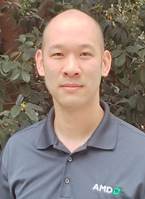Key Dates
Paper/Poster Submission Deadline
Friday January 24, 2014, 11:59.59 PM (PST)
Author Notification
Friday February 28, 2014
Camera-Ready Papers Due
Friday March 28, 2014
Submission
Submit your paper
here
Sponsors



General Chair
Pedro Trancoso
University of Cyprus, CY
Program Chairs
Diana Franklin
UCSB, US
Sally A. McKee
Chalmers, SE
For more information,
visit the website at
www.computingfrontiers.org

Computing Frontiers 2014 is proud to announce the following keynote
speakers and talks this year:
- Keynote 1:
Bruce Jacob
High-Bandwidth, High-Capacity, Low-Power Memory Systems
- Keynote 2:
Gabriel Loh
Evolutionary Paths to Revolutionary Frontiers
- Keynote 3:
David Bailey
Fooling the Masses: Reproducibility in High-Performance Computing
Fooling the Masses: Reproducibility in High-Performance Computing
 David Bailey, Research Fellow at University of California, Davis, US
David Bailey, Research Fellow at University of California, Davis, US
Abstract:
Reproducibility is emerging as a major issue for highly parallel
computing, in much the same way (and for many of the same reasons) that
it is emerging as an issue in other fields of science, technology and
medicine, namely the growing numbers of cases where other researchers
cannot reproduce published results. This talk will summarize a number
of these issues, including the need to carefully document computational
experiments, the growing concern over numerical reproducibility and,
once again, the need for responsible reporting of performance. Have we
learned the lessons of history?
Bio:
David Bailey is mathematician / computer scientist with the Lawrence
Berkeley Laboratory in Berkeley, California, and also a Research Fellow at
the University of California, Davis. He has authored more than
170 technical papers, five books, and numerous blog columns and
commentaries. He recently retired from the Berkeley Lab, but continues as
an active researcher.
Evolutionary Paths to Revolutionary Frontiers
 Gabriel Loh, Fellow Design Engineer in AMD Research, US
Gabriel Loh, Fellow Design Engineer in AMD Research, US
Abstract:
Academic researchers often find themselves in a conundrum between doing
high-risk, forward-looking research and trying to have more immediate
impact on real-world problems. In fact, many in industry (perhaps myself
included) are guilty of telling researchers to go look ahead and tell us
what the future holds and what industry should do, and then when the
researchers come back with stunning visions of the future, we respond with
comments like "that's not practical" or "that's not how we do things today".
In this talk, I will draw on some of my experiences as both a university
professor as well as a researcher in industry, and discuss some computing
revolutions and how academic research plays a central and critical role.
As an example, I will use the on-going revolution in die-stacking
technologies to describe my view of how forward-looking visions combined
with evolutionary steps have gotten us to where we are today, why we
haven't gotten here sooner, and why some may want further delays. I will
also discuss other revolutions that are either underway or lurking in the
future. From all this, despite the near-term value of incremental
near-term innovations to industry, I will build a case for academic
researchers to continue thinking big and to push the frontiers of computing.
Bio:
Gabriel H. Loh is a Fellow Design Engineer in AMD Research, the research
and advanced development lab for Advanced Micro Devices, Inc. Gabe
received his Ph.D. and M.S. in computer science from Yale University in
2002 and 1999, respectively, and his B.Eng. in electrical engineering from
the Cooper Union in 1998. Gabe was also a tenured associate professor in
the College of Computing at the Georgia Institute of Technology, a visiting
researcher at Microsoft Research, and a senior researcher at Intel
Corporation. He is a senior member of IEEE and the ACM, (co-)inventor on
over fifty US patent applications, and a recipient of the US National
Science Foundation Young Faculty CAREER Award. His interests include
computer architecture, processor microarchitecture, memory systems,
emerging technologies, 3D die stacking, sushi, BBQ, ice hockey,
snowboarding, and mud running.
High-Bandwidth, High-Capacity, Low-Power Memory Systems
 Bruce Jacob, Professor at University of Maryland, US
Bruce Jacob, Professor at University of Maryland, US
Abstract:
In large systems, scale is determined by the memory needed: users of
supercomputers choose the number of nodes based on the amount of DRAM
they will receive; administrators in data centers and enterprise computing
run the largest workload possible before paging makes performance
unacceptable. These systems are not compute-bound; they are memory-bound.
This talk will discuss several of the recent solutions that our group has
helped to develop, including flash-based main memory systems and
Micron's Hybrid Memory Cube DRAM.
Bio:
Bruce Jacob is a Full Professor and former Director of Computer Engineering
in the Dept. of Electrical and Computer Engineering at the University of
Maryland, College Park. He received his Ars Baccalaureate, cum laude, in
Mathematics from Harvard University in 1988, and his M.S. and Ph.D. in
Computer Science and Engineering from the University of Michigan in 1995
and 1997, respectively. In addition to his academic credentials, he has
extensive experience in industry: he designed real-time embedded applications
and real-time embedded architectures in the area of telecommunications for
two successful Boston-area startup companies, Boston Technology (now part
of Comverse Technology) and Priority Call Management (now part of uReach
Technologies). At Priority Call Management he was employee number 2, the
system architect, and the chief engineer; he built the first working
prototype of the company's product, and he built and installed the first
actual product as well.
In recognition of Prof. Jacob's research program, he has been honored
several times as a University of Maryland "Rainmaker." In memory-systems
research, Jacob's cache and memory-management designs in Michigan's PUMA
processor demonstrated the viability of software-managed caches in
general-purpose systems (he coined the now-common term
"software-managed cache" in his 1998 ASPLOS paper, "A look at several
memory management units, TLB-refill mechanisms, and page table
organizations"). His work in advanced DRAM architectures at Maryland is the
first comparative evaluation of today's memory technologies, and he received
the prestigious CAREER Award from the National Science Foundation for his
early work in that area. Honors for his teaching include the departmental
George Corcoran Award, the University of Maryland Award for Teaching
Excellence, and his 2006 induction as a Clark School of Engineering Keystone
Professor. He has published over 50 papers on a wide range of topics,
including computer architecture and memory systems, low-power embedded
systems, electromagnetic interference and circuit integrity, distributed
computing, astrophysics, and algorithmic composition. His recently published
book on computer memory systems (Jacob, Ng, and Wang: Memory Systems --
Cache, DRAM, Disk, Morgan Kaufmann Publishers, Fall 2007) is large enough
to choke a small elephant.



 David Bailey, Research Fellow at University of California, Davis, US
David Bailey, Research Fellow at University of California, Davis, US
 Gabriel Loh, Fellow Design Engineer in AMD Research, US
Gabriel Loh, Fellow Design Engineer in AMD Research, US
 Bruce Jacob, Professor at University of Maryland, US
Bruce Jacob, Professor at University of Maryland, US

